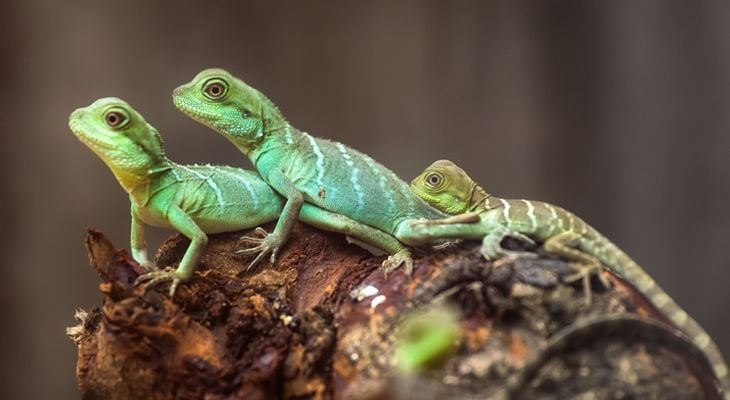Chinchillas are playful, loveable, and amusing pets. If you want yours to remain in your family for long, you should ensure that it has a good diet. Chinchillas require a lot of attention due to their playful nature; therefore, it is best to have supervised playtime with yours if you want to create a
Read more

People with limited living quarters may find that reptiles such as lizards or turtles fit perfectly into their lifestyles. Before deciding on a reptile, learn as much as possible about them and their needs. Poisonous snakes and certain reptiles should never be kept as pets. Ask your veterinarian about the suitability of a particular animal before you make your decision. There are many things to consider before committing to a reptile as a pet.
Finding out if a Pet is Legal Where You Live
Many areas have enacted laws pertaining to keeping reptiles. Some are general and some are quite specific; in many places any reptiles that are considered dangerous (venomous snakes, alligators, etc.) are illegal but some places are even more restrictive (for example, in some states all constricting snakes including ball pythons are illegal).
Salmonella Risks and Prevention
All reptile owners need to be informed about Salmonella infections. While the risks shouldn't keep most people from keeping reptiles since with the proper management the risks are minimal. Still, owners should be aware of the risks, and the US Centers for Disease Control recommends that certain risk groups should be careful about contact with reptiles and amphibians.
The Importance of Light and Heat
Many problems with keeping reptiles can be traced back to not providing the proper environmental conditions, particularly heat. Proper lighting is also important for many reptiles. The equipment to provide the proper heat and light to captive reptiles is often quite expensive, but is absolutely essential to keeping pet reptiles healthy. It is important to find out exactly what conditions your reptile needs and never cut corners when it comes to meeting those conditions!
Why Choose Captive Bred Reptiles
There are numerous reasons why you should pick a captive bred reptile if at all possible, as explained here.
How to Pick a Healthy Reptile
It is important to keep in mind that depending on where you get a reptile, it may be very stressed, dehydrated, and prone to illness. Here are some items to look for when buying your reptile to increase the chances of picking out a healthy pet reptile.
While there are many types of reptiles that could be good pets, here we cover a few you could consider.
-
Chinchillas
Category: Choosing Your Pet, Small Mammals, Pocket Pets, Chinchillas
-
Guinea Pigs
Category: Choosing Your Pet, Small Mammals, Pocket Pets, Guinea Pigs
Curious and inquisitive by nature, guinea pigs make great pets. These little bundles of fur are quite social and enjoy spending time with the people who handle, feed, and groom them. As a pet, guinea pigs are relatively low maintenance, rarely aggressive, and fun to own. How to Care Guinea pigs are playful,
Read more -
Hedgehogs
Category: Choosing Your Pet, Small Mammals, Pocket Pets, Hedgehogs
Shy animals that roll into a ball when scared, hedgehogs are covered with spiky quills. They're small, clean, and fun to watch so they're quite popular as pets. Even so, these little guys need lots of activity to stay healthy. Health Hedgehogs can have health problems, including dental diseases, skin
Read more -
Hamsters
Category: Choosing Your Pet, Small Mammals, Pocket Pets, Hamsters
Hamsters are cute and adorable. If you had one growing up, your parents probably took care of it. Taking care of them can be challenging; however, once you master the art, it becomes more manageable by the day. Here is how you can take care of your pet hamster. Bathing and Grooming Hamsters always stay
Read more -
What Your Dog’s Body Language Means
Category: Newsletter Library
-
How to Help Your New Cat Feel Welcomed in Your Home
Category: Newsletter Library, Cats
-
Fleas
Category: Pet Health, Pests and Parasites, Pet Health
A common parasite, fleas are found in almost every area of the world and can be found on dogs, cats, and many other mammals. They survive year to year even in cold climates because they live on pets, in buildings, and on wild animals. There are four stages to the flea life cycle. Eggs are laid by an
Read more -
Hypothyroidism
Category: Pet Health, Chronic Conditions, Pet Health
Hypothyroidism is the natural deficiency of thyroid hormone and is the most common hormone imbalance of dogs. This deficiency is produced by several different mechanisms. The most common cause (at least 95% of cases) is immune destruction of the thyroid gland. It can also be caused by natural atrophy
Read more -
Most Common Digestive Issues in Dogs and How to Relieve Them
Category: Newsletter Library, Nutrition & Food
-
Glaucoma in Cats
Category: Newsletter Library, Cats
-
Keep Your Pets Safe From Toxic Household Items
Category: Newsletter Library, Pet Dangers
-
Preventing Obesity in Cats
Category: Newsletter Library, Cats
Even one extra pound could affect your pet's health. Find out how you can keep your cat slim and trim.
Read more -
Pet Dental Care - Tips to Manage Your Pet’s Oral Health
Category: Newsletter Library, Keeping Pets Healthy
-
Learn How to Master Walking Your Dog for Walk Your Pet Month
Category: Newsletter Library, Seasonal Topics
-
Bringing a New Pet in the Home in the New Year
Category: Newsletter Library, Seasonal Topics
Are you planning on adding a pet to your family this year? These tips will help you prepare for the arrival of your furry, feathered, or finned friend.
Read more -
Cold Symptoms in Dogs
Category: Newsletter Library, Keeping Pets Healthy
